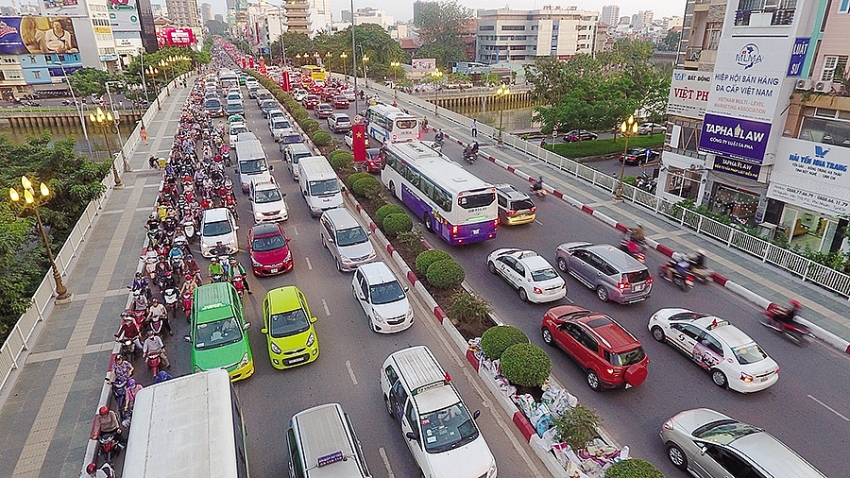Transport survey outlines future cash conditions
 |
| Transportation in urban centres is expected to come under increased strain from a rapidly rising population Photo: Le Toan |
Visa, the world’s leader in digital payments, along with Stanford University have launched a study on the future of transportation to better understand the challenges commuters face today.
Building on Visa’s experience working with transit operators, automotive companies and technology start-ups, the study examines the growing demand for public and private transportation, and the important role that digital commerce plays in driving sustainable growth.
“The future success of our cities is intertwined with, and reliant on, the future of transportation and mobility. Visa and our partners have an important role to play, both in streamlining the payment experience for millions of commuters around the globe, and supporting public transportation authorities in their quest to build sustainable and convenient transportation solutions that improve the lives of the people who use it,” explains Mike Lemberger, Visa’s European head of Product and Solutions.
The study, which reflects the feedback of 19,000 consumers across 19 countries and identifies significant challenges faced by growing urban centres, finds that 46 per cent of consumers globally have seen commuting times increase, half (52 per cent) are frustrated with the experience of using public transport, and one third of those surveyed (37 per cent) expect that their commuting time will increase over the next five years.
According to the study, complexity in payment is often at the root of many common complaints. Accordingly, if it was easier to pay for public transport, average use would increase by 27 per cent, 44 per cent said not knowing how much to pay is a problem. Some 41 per cent cited services being cash-only as an annoyance. According to those surveyed, these frustrations make them less likely to use public transport and more likely to drive their own cars.
To solve the issue, Visa is recommending that city governments invest in an “always on” data infrastructure, which is fundamental to the technology solutions that consumers demand. It supports real-time data exchange that can inform people about their journey as well as provide insight for cities to ensure that services meet shifting demand.
They should also create a seamless payment experience to support commuter journeys with multiple legs. City governments and urban planners need to collaborate with think tanks, automotive and technology firms, and payments providers such as Visa.
Furthermore, as companies and municipalities increasingly incorporate digital payments, they also need to integrate instant authentication. Designing commerce systems with all members of society in mind and developing strategic partnerships to drive insights are also the other solutions.
According to the United Nations, by 2050, 68 per cent of the world’s population will live in urban centres, and the number of megacities with populations greater than 10 million people will rise from 43 today to 51 within that same period. This is expected to cause pressure on transportation.
Payments lie at the heart of every form of travel, and will continue to become more integral as more cities move to contactless public transportation, digital payments for parking, and rental services such as bikes or scooters, according to the study.
What the stars mean:
★ Poor ★ ★ Promising ★★★ Good ★★★★ Very good ★★★★★ Exceptional
Related Contents
Latest News
More News
- Cashless payments hit 28 times GDP in 2025 (February 04, 2026 | 18:09)
- SSIAM and DBJ launch Japan Vietnam Capital Fund (February 04, 2026 | 15:57)
- Banks target stronger profits, credit growth in 2026 (February 04, 2026 | 15:43)
- Vietnam on path to investment-grade rating (February 03, 2026 | 13:07)
- Consumer finance sector posts sharp profit growth (February 03, 2026 | 13:05)
- Insurance market building the next chapter of protection (February 02, 2026 | 11:16)
- NAB Innovation Centre underscores Vietnam’s appeal for tech investment (January 30, 2026 | 11:16)
- Vietnam strengthens public debt management with World Bank and IMF (January 30, 2026 | 11:00)
- Corporate bond market poised for stronger growth cycle (January 28, 2026 | 17:13)
- Vietnam's IPO market on recovery trajectory (January 28, 2026 | 17:04)

 Tag:
Tag:




















 Mobile Version
Mobile Version